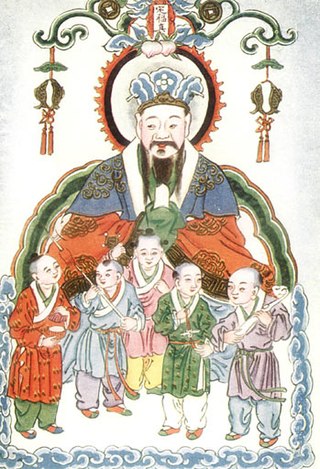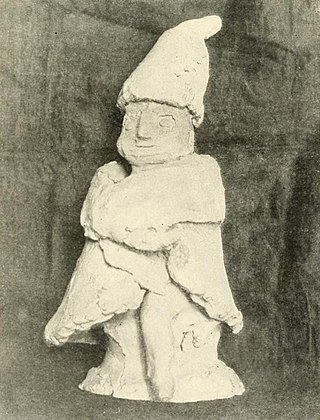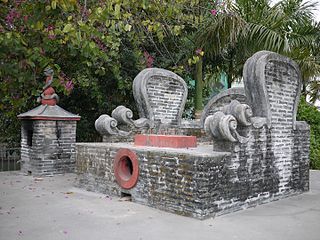A tutelary is a deity or a spirit who is a guardian, patron, or protector of a particular place, geographic feature, person, lineage, nation, culture, or occupation. The etymology of "tutelary" expresses the concept of safety and thus of guardianship.

The kitchen deity – also known as the Stove God, named Zao Jun, Zao Shen, TSgt Chun, Zao kimjah, Cokimjah or Zhang Lang – is the most important of a plethora of Chinese domestic gods that protect the hearth and family. The Kitchen God is recognized in Chinese folk religion, Chinese mythology, and Taoism. Under different names, he is also celebrated in several other Asian religions.
The Maonan people are one of the 56 ethnic groups officially recognized by the People's Republic of China. There are a total of 101,192 Maonan as of 2010, mostly living northern Guangxi and southern Guizhou in southern China.

Zao is an American metalcore band founded in Parkersburg, West Virginia, and later relocated to Greensburg, Pennsylvania. Founded in March 1993, Zao has hosted several musicians and endured numerous roster changes to the point where no original members remain. Former drummer Jesse Smith, vocalist Dan Weyandt, and guitarists Scott Mellinger and Russ Cogdell are seen by some fans as the "core" of Zao, with the current line up being the longest running in the band's history.

A household deity is a deity or spirit that protects the home, looking after the entire household or certain key members. It has been a common belief in paganism as well as in folklore across many parts of the world.

Shugendō is a highly syncretic religion, a body of ascetic practices that originated in the Nara Period of Japan having evolved during the 7th century from an amalgamation of beliefs, philosophies, doctrines and ritual systems drawn from local folk-religious practices, Shinto mountain worship, Buddhism and Taoism. The final purpose of Shugendō is for practitioners to find supernatural power and save themselves and the masses by conducting religious training while treading through steep mountain ranges. Practitioners are called Shugenja or Yamabushi. The mountains where shugendo is practiced are all over Japan, and can span multiple mountains within one range such as the Ōmine mountain range with Mount Hakkyō and Mount Ōmine or the Ishizuchisan mountain range with Kamegamori and Tengudake.

A Tudigong is a kind of Chinese tutelary deity of a specific location. There are several Tudigongs corresponding to different geographical locations and sometimes multiple ones will be venerated together in certain regions.
Asia is the largest and most populous continent and the birthplace of many religions including Buddhism, Christianity, Confucianism, Hinduism, Islam, Jainism, Judaism, Shinto, Sikhism, Taoism, and Zoroastrianism. All major religious traditions are practiced in the region and new forms are constantly emerging. Asia is noted for its diversity of culture. Islam and Hinduisms are the largest religion in Asia with approximately 1.2-1.3 billion adherents each.

The Kitchen God's Wife is the second novel by Chinese-American author Amy Tan. First published in 1991, it deals extensively with Chinese-American female identity and draws on the story of her mother's life.

Kōjin, also known as Sambō-Kōjin or Sanbō-Kōjin, is the Japanese kami (god) of fire, the hearth and the kitchen. He is sometimes called Kamado-gami, literally the god of the stove. He represents violent forces that are turned toward the betterment of humankind.

A spirit tablet, memorial tablet, or ancestral tablet is a placard that people used to designate the seat of a deity or past ancestor as well as to enclose it. The name of the deity or the past ancestor is usually inscribed onto the tablet. With origins in traditional Chinese culture, the spirit tablet is a common sight in many East Asian countries, where forms of ancestor veneration are practiced. Spirit tablets are traditional ritual objects commonly seen in temples, shrines, and household altars throughout Mainland China and Taiwan.
Landlord deities (地主神) are a type of tutelary deity worshipped in the East Asian cultural sphere.

A liminal deity is a god or goddess in mythology who presides over thresholds, gates, or doorways; "a crosser of boundaries". These gods are believed to oversee a state of transition of some kind; such as, the old to the new, the unconscious to the conscious state, the familiar to the unknown.

Mountain Gods (山神) are Asian tutelary deities associated with mountains. They are related to landlord deities and tudigongs and City Gods.
Jowangshin is the goddess of fire and the hearth in Korean shamanism. As the goddess of the hearth, the rituals dedicated to her were generally kept alive by housewives. She is no longer the subject of worship, but still remains one of the most famous Korean deities.

In Korean shamanism, Gasin are a branch of deities believed to protect the various objects and rooms of the house, such as jangdok or the kitchen. The Gasin faith is the faith based on worshipping these deities. The worshipping of the Gasin form a central and integral part of the traditional Korean folk religion.
Cheuksin is the toilet goddess of Korean mythology. Unlike better-known household deities such as Jowangshin, god of the hearth, her worship forms a minor part of the Gasin cult.

Chinese folk religion plays a dynamic role in the lives of the overseas Chinese who have settled in the countries of this geographic region, particularly Burmese Chinese, Singaporean Chinese, Malaysian Chinese, Thai Chinese, Indonesian Chinese and Hoa. Some Chinese Filipinos also still practice some Chinese traditional religions, besides Christianity of either Roman Catholicism or Protestantism, with which some have also varyingly syncretized traditional Chinese religious practices. Chinese folk religion, the ethnic religion of Han Chinese, "Shenism" was especially coined referring to its Southeast Asian expression; another Southeast Asian name for the religion is the Sanskrit expression Satya Dharma.

Several Eastern folk religions practice in the worship of whales. This practice is common in Vietnamese folk religion, where it is known as Cá Ông. In Vietnamese religion, whales are believed to be guardian angels that protect fishermen. Beached whales are buried and given funerals, and festivals are held in honor of whales.












